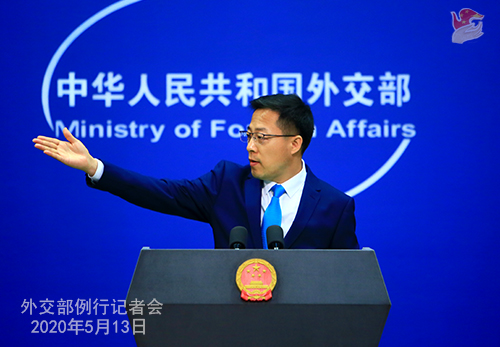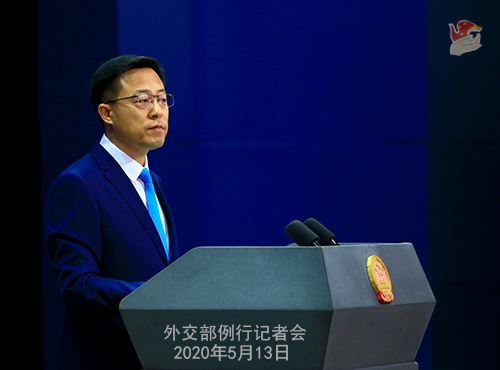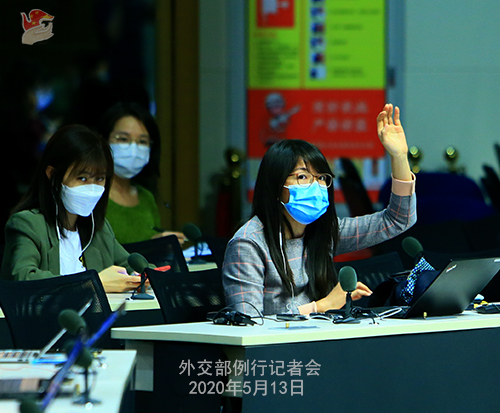| Foreign Ministry Spokesperson Zhao Lijian's Regular Press Conference on May 13, 2020 |
| 2020-05-13 21:12 |
|
China Daily: We noticed that the Chinese medical team on COVID-19 to Ethiopia and Djibouti have accomplished their mission and returned to China on May 12. Can you give us more details on their work overseas? Zhao Lijian: The team of medical experts to Ethiopia and Djibouti was one of the first group of COVID-19 experts sent by the Chinese government to Africa. The experts arrived in Ethiopia on April 16 and then traveled to Djibouti on April 30. In the past month or so, they shared anti-epidemic experience and know-how with WHO officials in the African Union, the Africa CDC and local medical institutions and health officials. The experts visited designated hospitals, quarantine centers and testing centers, discussed the epidemics with local medical workers and made calibrated propositions for containment and treatment. Their dedication and professionalism has been highly commended by the African side. On May 10, Djiboutian Prime Minister Abdoulkader Kamil Mohamed awarded the Independence Day Medal of the Republic of Djibouti to the 12 members of the expert team for their contributions to the country. After the COVID-19 pandemic broke out, China sent five medical teams to Africa and held nearly 30 video conferences with African countries. The more than 40 medical teams already working in Africa also took active action, carrying out about 400 training activities to share anti-epidemic experience and provided training to over 20,000 local medical workers. These numbers vividly demonstrate a closer China-Africa community with a shared future. China will continue standing firm with our African brothers and supporting their efforts to fight COVID-19 for the final victory against the virus. CRI: According to reports, China and Caribbean countries with diplomatic relations with it held a special vice foreign ministers' video conference on COVID-19 yesterday. What does China think of the outcomes of this meeting? With the pandemic still wreaking havoc around the world, how does China plan to offer more support and assistance to Caribbean states whose national public health systems are relatively fragile? Zhao Lijian: Yesterday, China and Caribbean countries having diplomatic relations with it held a special vice foreign ministers' meeting on COVID-19 via video link. Delegates from China and nine Caribbean states attended the virtual meeting co-hosted by Vice Foreign Minister Zheng Zeguang and Foreign Minister Kenneth Darroux of the Commonwealth of Dominica. They held in-depth exchange over issues including domestic COVID-19 situation and response, China-Caribbean cooperation in fighting the pandemic, and the two sides' coordination and cooperation in international affairs, reaching wide consensus. This was an important meeting between China and Caribbean countries at a crucial juncture in the global fight against COVID-19. All sides expressed readiness to enhance cooperation in prevention and control and jointly uphold global health security. The Caribbean side also expressed objection to politicizing, stigmatizing and labeling practices under the pretext of the pandemic, and support for WHO's leading role in the global response. Caribbean countries reiterated their commitment to the one-China principle and to mutual assistance with China on matters concerning each other's core interests and major concerns. China highly appreciates this. China and the Caribbean countries have been supporting and assisting each other in the fight against COVID-19, adding a new chapter to China-Caribbean friendship. This virtual conference served to steer the two sides' next-stage cooperation in fighting the pandemic. Going forward, China will continue to firmly support the Caribbean side's efforts against COVID-19, share our containment experience and treatment solutions, offer material and technical assistance, and facilitate foreign purchase of medical materials in China. Meanwhile, we will actively expand all-round practical cooperation with the Caribbean countries in areas like trade and investment and strengthen communication and coordination in international and regional organizations to elevate relations to a new level. The pandemic will pass eventually but what China and the Caribbean countries have is an enduring relationship. The friendship and cooperation between the two sides, after the test of this pandemic, will emerge stronger and more profound. AFP: Regarding the French government's plan to sell weapons to Taiwan, I understand the foreign ministry firmly opposes that and demands the French side withdraw its plan, but the French company just refuted China's criticism. I wonder what's your response to that? Zhao Lijian: Our position is consistent and clear: we firmly oppose other countries selling arms to the Taiwan region or conducting military exchange with it. We have expressed grave concerns to the French side. Once again we urge the French side to earnestly abide by the one-China principle and withdraw its arms sales plan to avoid more damage to China-France relations. ABC Australia: Australian Trade Minister Simon Birmingham has expressed that he is seeking talks with his Chinese trade counterpart to discuss both the suspension of four Australian beef companies export certification and also the potential barley tariffs. Would the Chinese side be willing to facilitate talks at the political level about these two issues? Zhao Lijian: I stated China's position in the past couple of days on Australian beef exports and tariffs on Australian barley. Like we said, China's position on its relationship with Australia is clear and consistent. Sound and stable China-Australia ties serve the common interests of both, but it takes efforts from both sides to ensure such a relationship. We hope Australia can work with us to uphold mutual respect, equality and mutual benefit and strive to advance bilateral cooperation and mutual trust, as is in keeping with the two sides' comprehensive strategic partnership. On the specific matter your mentioned, I'll leave that to the competent authorities. The Paper: According to reports, Canada's National Research Council said on May 12 that the Canadian side is working with China's CanSino Biologics Inc. to prepare the ground for future testing of vaccines in Canada. The company is planning to file applications for clinical trials with the Canadian health authorities. How does China see health cooperation between the two countries, including on vaccine development? And how do you see the two countries cooperation in fighting COVID-19 since it broke out? Zhao Lijian: Since COVID-19 broke out, China and Canada have been supporting and assisting each other with robust anti-virus cooperation. The 32 tonnes of medical supplies donated by the Chinese government just arrived in Canada the other day. China has also been facilitating Canada's commercial purchase of medical supplies in China. The virus poses a challenge to all mankind as it respects no borders. Development of vaccines is of vital importance to the prevention and control of the pandemic, and so holds the key to defeating the virus. China is actively pursuing international cooperation in research and development of drugs and vaccines with many countries, including Canada. We stand ready to work with the Canadian side and the rest of the world to accelerate the development and production of COVID-19 medical products and contribute to global public health security and the joint response to the pandemic.
Bloomberg: A London-based researcher named Benjamin Strick says that between April 25 and May 3, he identified more than 1,000 accounts on Twitter that were associated with an alleged Chinese disinformation effort. The accounts have been used to promote content attacking critics of the Chinese government and to spread conspiracy theories, according to this researcher. I wonder the Ministry of Foreign Affairs have any comment on this? Zhao Lijian: Twitter has responded to some allegations about China spreading disinformation on this platform and denied the claims. China opposes creating or spreading disinformation. Allegations in relevant reports of China spreading disinformation on Twitter are unfounded. AFP: US Republican Senators on Tuesday proposed a new legislation, which will give US executive authorities the power to slap sanctions on China if it does not give a full account of the coronavirus outbreak or close all wet markets. Does China have any reaction to this move from the US Republican senators? Zhao Lijian: This act sponsored by several US lawmakers shows no respect for facts. By pushing for investigations based on the presumption of guilt, it is meant to shirk responsibility for the US fumbling response to China. This is highly immoral. We are firmly opposed to it. Since the outbreak began, China has been acting in an open, transparent and responsible way. We have maintained close communication and cooperation with WHO and supported its global efforts against COVID-19 with concrete actions. All these have been recognized by the international community. We also support assessing countries' response at an appropriate time to promote international health cooperation and global public health governance so we can react better to similar challenges in the future. China has passed legislation banning all illegal hunting, trading, transportation and consumption of wild animals. There are no so-called "wildlife wet markets" in China. What you can find are farmers' markets and live poultry and seafood markets. Such markets not only exist in China, but are also commonplace sights in many other countries as well. There's no international law restricting their operation. The website of Politico previously exposed a 57-page memo the National Republican Senatorial Committee sent to electoral organizations, which encouraged "actively attacking China" as a response to the coronavirus crisis. It stressed three main lines of assault, including attributing the spread of virus to China's cover-up. The memo boils down to attacking China whenever the outbreak is mentioned. The US may want to continue staging this show of blaming China, but their screenplay has been laid bare so badly that there is no point in going ahead with it. A word of advice to those in the US: Don't get too deep in the show to lose sight of reality. These US politicians should focus their attention and energy on fighting the outbreak and protecting American people, do what they are supposed to do and contribute constructively to the global cooperation against COVID-19, instead of racking their brains to distract attention and deflect responsibility. Bloomberg: The Paris Club chair has said that China is expected to provide debt relief as other nations that joined the agreement by taking part in a global drive to pause debt payment for poor countries that need the funds to combat the pandemic. We were wondering if this is true? Zhao Lijian: China is not a member of the Paris Club. Since 2013, China has been attending its activities regularly in an ad hoc manner. Our communication with the Paris Club members flows smoothly. Due to the outbreak, the global economy is facing greater downward pressure and increasing factors for uncertainty and instability. Many developing countries are confronted with economic development challenges and rising default risks. China, upholding a vision of building a community with a shared future for all mankind and putting fairness before interests, has contributed to the poverty reduction and development in other developing countries as its ability permits. Recently, China joined the G20 initiative to "support a suspension of debt service payments for the poorest countries" which freeze both principal repayments and interest payments for these countries from May 1, 2020 to the end of 2020. China will strengthen communication and cooperation with all sides to implement follow-on measures of this initiative. We also call on relevant multilateral financial institutions and private creditors to take corresponding measures to lessen debt burdens of strained developing countries. We will continue to work with all sides to minimize negative impacts this pandemic has caused to the world economy and all countries' economies and realize development for all. CNN: There are reports that debris from the Chinese rocket Long March-5B launched last week fell onto at least two villages in Africa's Ivory Coast. Could you confirm and offer more information? Zhao Lijian: I have no information on that and refer you to the competent authorities. Reuters: The US administration is pressing a retirement savings fund to not invest in certain Chinese companies, which it says violate human rights or threaten national security. What's your comment on this? Zhao Lijian: Like we said repeatedly, in an era of globalization, the interests of all countries are highly intertwined. The nature of China-US economic cooperation is mutually beneficial. In recent years, China's capital market has attracted investors from all over the world, including the US. This demonstrates confidence in China's steady growth and bright prospects as well as recognition of its efforts in deepening reform and opening-up of the capital market. It is inconsistent with the laws of the economy to obstruct or even politicize normal US investment in Chinese markets under the pretext of national security. It will only cost them business opportunities and undermine the interests of US investors. Reuters: A US government commission has said that the WHO's exclusion of Taiwan has led to more lives being lost in the pandemic. Do you have any comment on this? Zhao Lijian: I believe you were referring to the US China Economic and Security Review Commission. Its reports are always distorting facts and full of bias. China's position on the Taiwan region's participation in WHO activities is clear and consistent. It must be handled according to the one-China principle. Under this precondition, China's Central Government has made proper arrangement for the Taiwan region's participation in global health affairs, which ensures that the region can deal with local or global public health emergencies in a timely and effective manner. The Taiwan region is never excluded from the WHO global anti-epidemic system. Since the outbreak of COVID-19, the DPP authorities in Taiwan have been doing all they can to make reckless political maneuvers and hype up Taiwan's participation in WHO and the World Health Assembly. Their real intention is to solicit foreign support and seek independence under the pretext of the pandemic. We are firmly opposed to that. Their scheme will never succeed. China urges relevant side in the US to abide by the one-China principle and stop backing the Taiwan authorities' political maneuvering to seek independence under the disguise of epidemic response, so as to avoid disrupting global solidarity and cooperation against the pandemic.
|
| |||||||||||||||
|
|||||||||||||||




